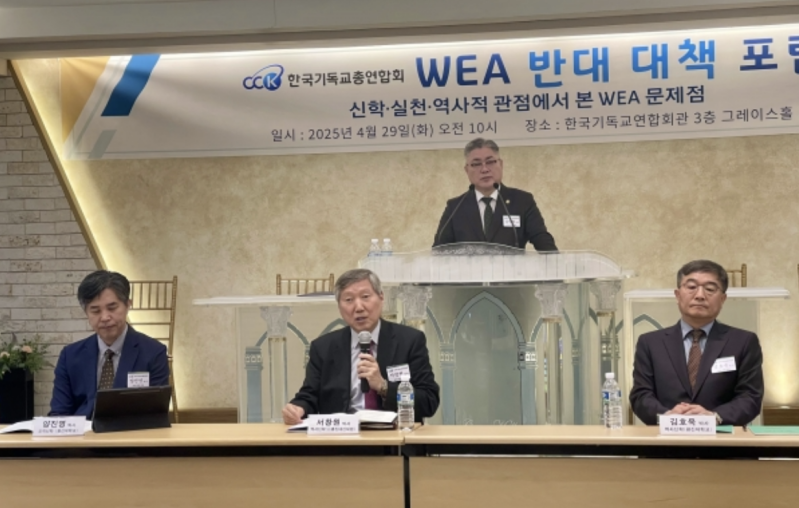
A forum hosted by South Korean evangelical leaders this week renewed criticism of the upcoming World Evangelical Alliance (WEA) General Assembly in Seoul, which has faced controversy since its announcement. Speakers at the event accused the WEA of theological compromise, interfaith inclusivism, and straying from historic evangelical and Reformed principles.
The Christian Council of Korea (CCK), the former national member body of the World Evangelical Alliance in Korea led by Rev. Kyung-hwan Ko, hosted its first “WEA Countermeasure Forum” on April 29 at Grace Hall in the Christian Council Building in Seoul. Titled “Problems with the WEA from Theological, Practical, and Historical Perspectives,” the event featured presentations by Dr. Jin-young Yang (Kwangshin University), Dr. Chang-won Seo (formerly of Chongshin Seminary), and Dr. Ho-wook Kim (Kwangshin University).
Forum accuses WEA of promoting “cultural inclusivism” contrary to evangelical identity
Dr. Yang opened the forum with a presentation titled, “Critique of the WEA Seoul Assembly: Regarding Its Statement of Faith and Core Values.” He argued that while WEA materials list “Evangelical,” “Orthodox,” and “Conservative” as core values, these are not reflected in practice. “WEA’s real ministry is that of cultural inclusivism,” he said, citing interfaith ties with the Roman Catholic Church, Islamic leaders, and the World Council of Churches (WCC), which he described as a “hotbed of religious pluralism.”
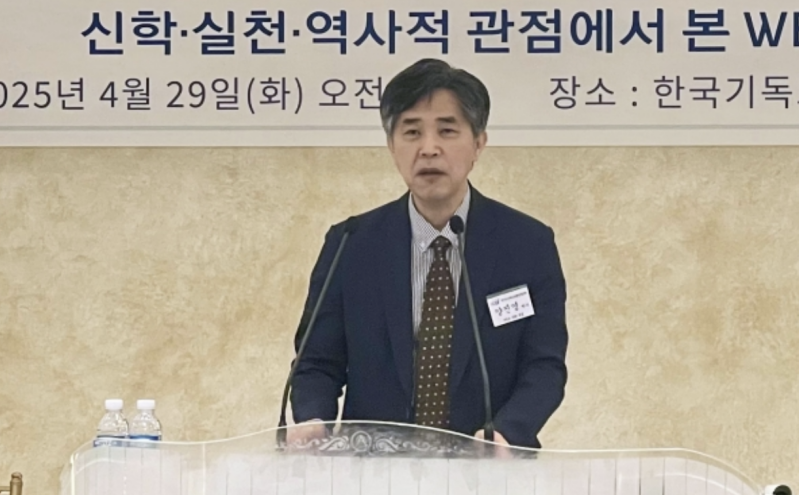
“On the surface, WEA’s core values seem unobjectionable,” Yang said, “but a closer examination reveals that its actual operations promote cultural inclusivity and seek grand compromise under the banner of ‘church unity’—a movement unrelated to biblical truth. In this sense, WEA aligns with the neo-evangelicalism of neoliberalism.”
Yang added that WEA emphasizes the visible unity of the church and insists on embracing even nominal faith statements. “This is why, despite WEA’s formal statement of faith, it interacts with Roman Catholics, the WCC, Seventh-day Adventists, and Muslims,” he said. “Such practice is not true theology.”
He concluded that Korean churches should not participate in WEA’s assembly or union. “Practicing love without truth contradicts the true gospel,” he said.
WEA leaders’ interfaith engagement sparks concern
Dr. Chang-won Seo followed with a presentation titled, “Problems and Concerns about the WEA from a Reformed Theological Perspective.” He criticized WEA leaders’ activities, pointing out that Deputy Secretary General Samuel Chiang has called Indonesia’s Nahdlatul Ulama, the world’s largest Muslim organization, WEA’s “Best Friends.”
“This directly contradicts WEA’s stated vision,” Seo said. “Seeking peace through interreligious cooperation ultimately blurs the exclusive truth of the gospel.”
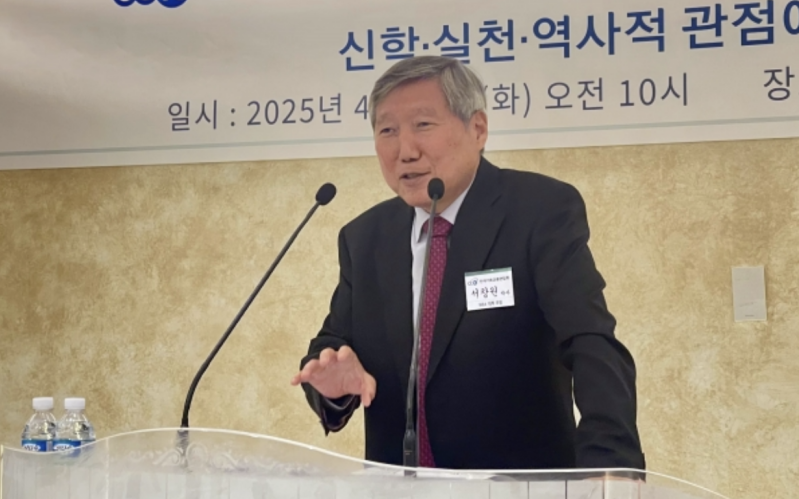
He also raised alarms about Goodwill Shana, WEA’s International Council Chair and acting Secretary General. “Shana is a Zimbabwean megachurch pastor known for promoting health-and-wealth theology. Some have even referred to him as ‘the Pope of the WEA,’” Seo said. He added that Shana’s wife refers to herself as an “apostle,” a hallmark of the controversial New Apostolic Reformation. “The fact that such figures are at the core of WEA leadership raises grave concerns about the direction and nature of the organization.”
Seo argued that the WEA Seoul assembly runs counter to Reformed theology and practice and lacks legitimacy, having been pursued by a few churches without broad denominational support. “This could damage the theological identity and spiritual integrity of the Korean church,” he warned.
He criticized the notion that a single church, simply by having resources to host an international event, could represent the entire Korean church. “Reformed churches must decisively reject this trajectory. If possible, the Seoul assembly should be withdrawn to preserve theological integrity and spiritual purity,” Seo said. “If that is not possible, then churches committed to gospel truth should refrain from participating.”
WEA’s theological ambiguity and ecumenical drift
In the final presentation, Dr. Ho-wook Kim spoke on “Historical Background of the WEA Statement of Faith and Assessment of Its Theological Identity.” He criticized WEA’s use of the term “infallible” to describe its view of Scripture. “Infallibility refers to the belief that the Bible is without error in matters of faith and salvation, while inerrancy holds that the Bible is without error in all aspects,” he explained. “WEA’s use of ‘infallibility’ suggests a weaker theological stance.”
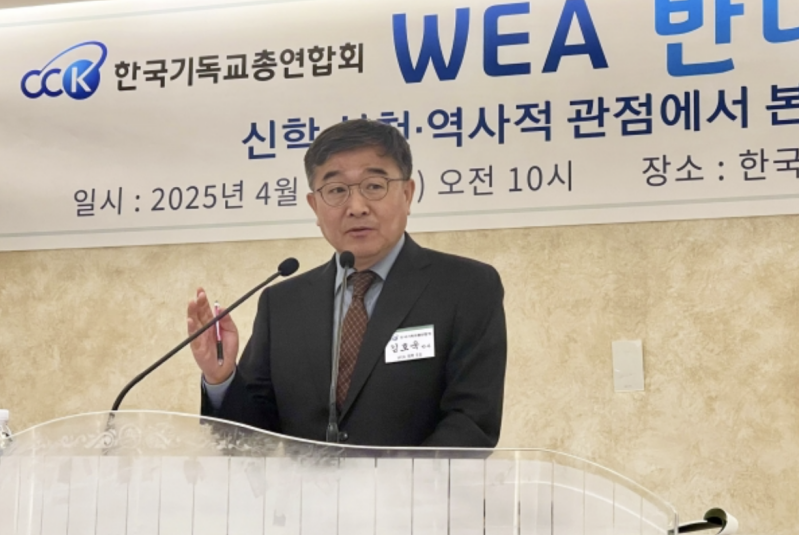
Kim also questioned WEA’s claim to be Reformed and evangelical. “They say criticisms about religious pluralism and syncretism are based on misunderstanding, but their actions contradict their claims.”
He reiterated concerns over Chiang’s engagement with Muslim organizations. “In 2021, WEA held formal talks with Nahdlatul Ulama and declared a ‘Best Friends’ relationship,” Kim said. “Chiang emphasized faith-based inclusivity in a world of religious diversity and argued for cooperation that transcends doctrinal differences to highlight shared human values.”
Kim noted that Chiang met with Judge Mohamed Abdelsalam, Secretary General of the Muslim Council of Elders, in Abu Dhabi on February 29, 2024. “That meeting was a pledge to strengthen cooperation and promote shared values.”
According to Kim, “WEA is breaking down theological boundaries and embracing diverse streams, including Roman Catholicism, Seventh-day Adventism, Islam, and the WCC. Its conduct contradicts its stated theology and reflects theological syncretism and pluralism.”
He concluded by calling for the cancellation of the Seoul assembly: “The 2025 WEA Seoul Assembly Organizing Committee should withdraw the event to resolve ongoing conflict within the Korean church and pursue biblical unity.”
CCK leadership voices institutional concerns
In his welcome address, CCK President Kyung-hwan Ko said the denominations of the WEA Seoul Assembly’s co-chairs do not support the event. “To say they are not opposing it is no justification. Lack of opposition is not the same as endorsement. How can someone claim to serve the global church without the backing of their own denomination?” he asked.
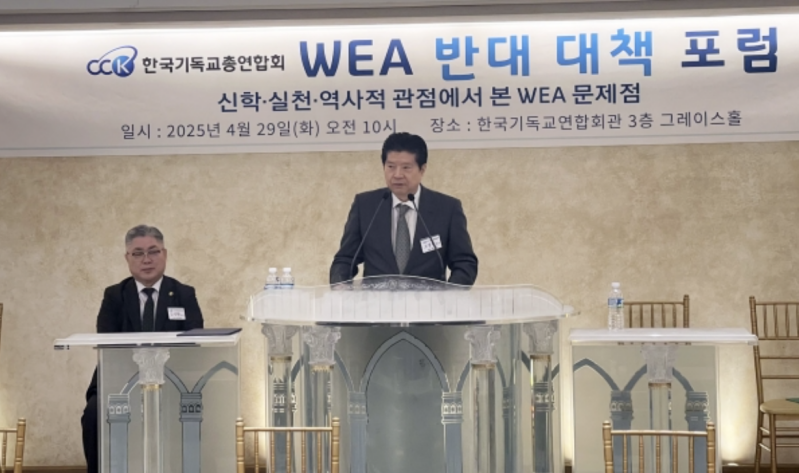
Ko proposed an open debate with scholars who support the WEA assembly and revealed that a formal whistleblower complaint from within WEA had been submitted. “We will publish the details on the CCK website,” he said.
Rev. Chung Seo-young, a former CCK president, preached at the opening service and also voiced concerns. “WEA’s original intent was acceptable. But it has changed. Until it returns to its evangelical roots, the assembly should not be held in Korea,” he said. “Many in the Korean church oppose this. Why push it through?”
The WEA has not yet issued any public statement or responded to earlier requests for comment from Christian Daily International.
Originally published by Christian Daily Korea, translated and edited by Christian Daily International staff.






